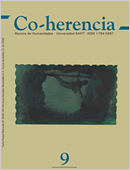La paz imposible. San Agustín como antecedente del Realismo Político.
Main Article Content
Keywords
Agustín de Hipona, Relaciones internacionales, Paz, Guerra, Política internacional, Realismo político
Resumen
El propósito de este texto es exponer la tensión constante de los conceptos de guerra y paz en san Agustín. Para ello vamos, primero, a realizar un seguimiento de los supuestos sicológicos que el hiponense formula como fundamentos de su consideración política; segundo, exponer las consecuencias de tales consideraciones dentro del orden político humano; y, finalmente, abordar el carácter analógico del concepto de paz, con el cual es usado en el escenario político como ideal del orden. Tanto en la introducción como en la conclusión, se abordará la cuestión de la inscripción de san Agustín dentro de los antecedentes clásicos del llamado ‘realismo político’.
Descargas
Referencias
Cicerón, M. T. (1981) La República. Buenos Aires, Orbis.
Craig, C. (2003) Glimmer of a New Leviathan. Total War in the Realism of Niebuhr, Morgenthau and Waltz. New York, Columbia University Press.
Deane, H. (1963) The Political and Social Ideas of St. Augustine. New York andLondon, Columbia University Press.
Deane, H. (1973) “Classical and Christian Political Thought”. En: Political Theory I(4).
Echavarría, S. (2008) “Momentos del enemigo. Antecedentes de una distinción”.En: Carl Schmitt. Derecho, política y grandes espacios. Giraldo, J. y Molina, J. (Eds.) Medellín, Fondo Editorial Universidad Eafit - SEPREMU.
Forde, S. (1995) “International Realism and the Science of Politics: Thucydides, Machiavelli, and Neorealism”. En: International Studies Quarterly XXXIX(2).
Gilpin, R. (1986) “The Richness of the Tradition of Political Realism”. En: R.O.Keohane (Ed.) Neorealism an Its Critics. New York, Columbia University Press.
Lewis, E. (1964) “The Political and Social Ideas of St. Augustine. By Herbert A. Deane”. En: Political Science Quarterly LXXIX(3).
Loriaux, M. (1992) “The Realists and Saint Augustine: Skepticism, Psychology and Moral Action in International Relations Thought”. En: International StudiesQuarterly XXXVI(4).
Martin, R. (1972) “The Two Cities in Augustine’s Political Philosophy”. En: Journal of the History of Ideas XXXIII(2).
Morgenthau, H. (2001) Escritos sobre política internacional. Madrid, Tecnos.
Rosati, J. (2000) “The Power of Human Cognition in the Study of World Politics”.En: International Studies Review II(3).
Rossi, M. (2000) “Agustín: El pensador político”. En: La filosofía política clásica. De la Antigüedad al Renacimiento. Borón, Atilio (Comp.) Buenos Aires, Clacso - Eudeba.
Rossi, M. (2005) “Cicerón y Agustín: contrafiguras para pensar la política”.En: Co-herencia III(2).
San Agustín (1959) De Christiana Doctrina. Madrid, Biblioteca de Autores Cristianos.
San Agustín (1942) Ciudad de Dios. Buenos Aires, Poblet.
Schopenhauer, A. (1993) El Mundo como voluntad y representación. Madrid, SigloXXI.
Söndergaard, B. (2008) “The political realism of Augustine and Morgenthau: Issues of Man, God, and just war” En: Alternatives: Turkish Journal of international relations VII(1).
Stevenson, W. (1988) Christian Love and Just War: Moral Paradox and political lifein St. Augustine and his modern interpreters. Macon (GA), Mercer University Press.
Thomas, S. (2001) “Faith, History and Martin Wight: The Role of Religion in the Historical Sociology of the English School of International Relations”. En: International Affairs LXXVII(4).
Tinder, G. (1997) “Augustine and the Limits of Politics”. Reviewed work By Jean Bethke Elshtain. En: The American Political Science Review, XCI(2).
Waltz, K. (1979) Theory of International Politics. Boston, McGraw Hill
